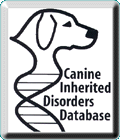
Intestinal lymphangiectasia
As part of the normal circulatory system, lymph fluid is collected from tissues throughout the body and returned to the blood by way of the lymphatic vessels. In intestinal lymphangiectasia, normal drainage is blocked so that intestinal lymph leaks into the intestines instead of being returned to the circulation. This results in the loss of proteins, lymphocytes ( a type of white blood cell), and lipids or fats into the stool.
Intestinal lymphangiectasia may be congenital (present from birth) due to malformation of the lymphatic system, or it may be acquired in association with another disease.
The inheritance is not known.
Signs of intestinal lymphangiectasia usually develop slowly over several months, and may come and go. Your dog may fail to gain weight or may progressively lose weight. The loss of protein into the bowel causes loss of fluid from the circulation into the limbs, the abdomen, or the chest. Your dog's legs and/or abdomen may appear swollen and he/she may have trouble breathing. There may be a chronic persistent or intermittent diarrhea due to the loss of protein, fluid and fat into the bowel.
If your dog has the signs described above, your veterinarian will likely suspect one of the diseases that result in loss of proteins into the gut. Laboratory tests and an intestinal biopsy are necessary to diagnose the specific cause.
This condition can not be cured but it can generally be well-managed by you and your veterinarian. Remissions of several months with occasional flare-ups are common.
The major goal of therapy is to reduce the loss of proteins into the intestine, to restore normal protein levels in your dog. This is done through diet, and medication to reduce inflammation in the intestinal wall. An ideal diet for dogs with intestinal lymphangiectasia contains minimal fat, and an ample quantity of high-quality protein. There are commercial prescription diets available which fulfill these requirements, or your veterinarian can give you information to prepare a low-fat diet at home. In either case, you will need to supplement your dog's diet with fat-soluble vitamins, due to the poor absorption of fat that occurs with this condition.
Corticosteroids are given to reduce inflammation, and thereby reduce loss of protein and associated diarrhea. Your veterinarian may also prescribe antibiotics.
CLINICAL: diarrhea is usually mild or inapparent, in comparison with other protein-losing enteropathies.
LABORATORY: hypoproteinemia with hypocholesteremia, lymphocytopenia, and/or hypoglobulinemia; frequently also see hypocalcemia due to vitamin D and calcium mal-absorption. It is important to assess liver and kidney function to rule out non-enteric causes of hypoproteinemia.
SURGERY: a biopsy is necessary for definitive diagnosis by histologic examination. At surgery, usually see prominent network of milky distended lymphatic channels in the mesentery or on serosal surface.
Dogs with familial intestinal lymphangiectasia and their close relatives should not be used for breeding.
FOR MORE INFORMATION ABOUT THIS DISORDER, PLEASE SEE YOUR VETERINARIAN.
Burrows, C.F., Batt, R.M., Sherding, R.G. 1995. Diseases of the small intestine. In S.J. Ettinger and E.C. Feldman (eds.) Textbook of Veterinary Internal Medicine. p. 1224-1225. W.B. Saunders Co., Toronto.
Williams, D.A. 1998 Protein-losing enteropathy Proc. 16th ACVIM Forum pp 419-421
- Disorder Type:

